Category Archive for Fashion
Puerto Rico Travels! Viator El Yunque rainforest tour review, Vianda San Juan restaurant, Condado & Isla Verde beach.
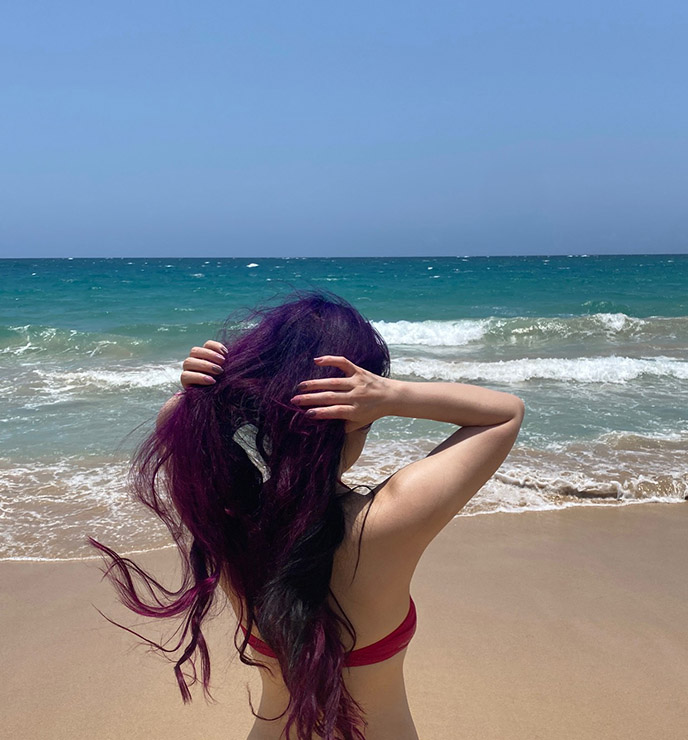
“Those grains of sand and waves are all waiting to take away what no longer serves you…”
In late May, I took some time off-line to fully appreciate Puerto Rico with one of my best friends, Molly. It was our first time on the Caribbean island, and we were intent on making the most of the uncrowded beaches and local restaurants. (Read on for a review of our outstanding dinner at Vianda.)

Read on for a guide to our favorite Puerto Rican spots, including a day trip to the lush rainforest, El Yunque, on a tour that we booked through Viator. (Still in awe over the waterfalls, rivers and mystical hiking trails…)

Molly and I stayed at an inexpensive Airbnb in San Juan, located within walking distance of Condado Beach. (I don’t recommend renting a car — you can easily Uber everywhere.) We ventured out for iced coffees and brunch at the nearby Pinky’s, and then made our way to the ocean.
(My red swimsuit is a Dolores Cortes Haiti bikini from UK Swimwear.)

San Juan has a laid-back and noncommercial feel that we loved. Condado Beach wasn’t crowded with tourists, all-inclusive resorts, or advertisements — anyone can access this public beach with picture-perfect waves.

For $20 (Puerto Rico uses US currency, as it’s a US territory), we rented an umbrella and chairs to keep us shielded from the sun. I took quick photos to show my mermaid hair… but most of the time, I’m huddled under a hat and parasol, with layers of mineral sunscreen!

Molly and I were keen to see the famous rainforest El Yunque, located an hour’s drive from San Juan. We booked this rainforest day tour through Viator, and it turned out to be one of the best small group touring experiences we’ve had.
Viator is the leading global experiences platform, with nearly 400,000 easy-to-book travel activities (including guided tours, sunset boat cruises, airport / car transfers, and more) worldwide.

I went to Viator.com and searched for Puerto Rico tours, and was delighted to find an enormous selection. I chose this El Yunque adventure on Viator (out of multiple rainforest tour options) because it had almost 100 excellent reviews, and the photos and details seemed like a perfect fit (ie, the hike was not too physically demanding).
Our outstanding guide, Isaac, picked us up directly from our San Juan Airbnb so we didn’t need to worry about transportation. After picking up four other guests from two nearby hotels, he took us on a small-group day trip to the famous rainforest, beginning at Yokahú Observational Tower.

Isaac riveted us with stories of the fascinating rainforest as he drove up the winding roads. El Yunque spans almost 29,000 acres, and is the only tropical habitat in the U.S. National Forest system. These peaks are typically rain-soaked, but we lucked out and had clear skies and views.
We walked up 98 steps to the top of Yokahu Tower for deep green panoramic views of El Yunque.

Then, our guide introduced us to Catarata Coca, a dramatic waterfall tumbling over a steep stone face and mossy boulders. (Swipe left on my Instagram post here to see video of this 85 foot tall El Yunque waterfall.)

To top it off, Isaac led us on a nature walk beneath the rainforest canopy, which opened up to one of the many rivers that flow through El Yunque. We met some charming creatures along the way, such as this curious orange lizard.
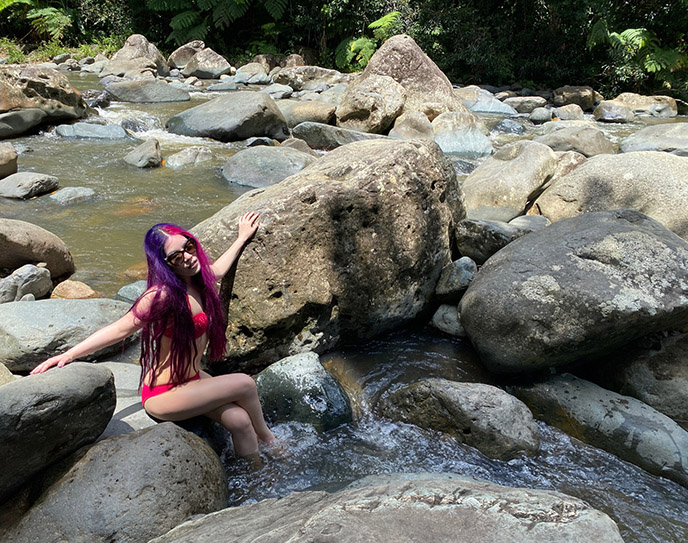
The leisurely day tour gave us plenty of time to take a dip in the Mameyes River, if we wished. While I waded around the rocks and streams, Molly dove in like a savage!
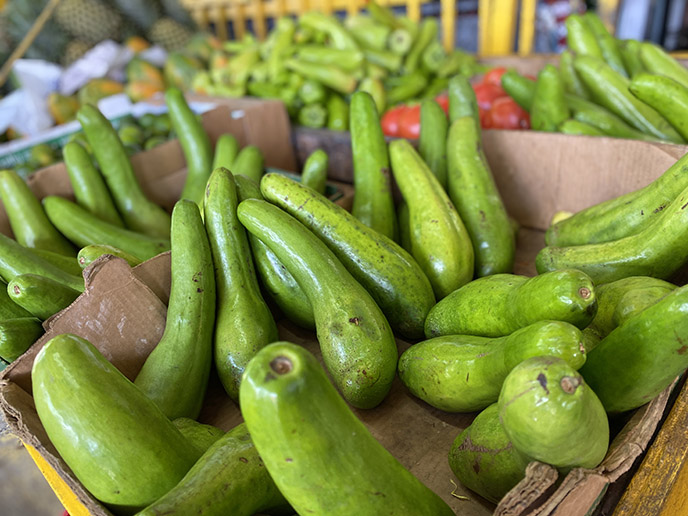
We were ready to eat after a day of rainforest exploration. Isaac drove us to a local food stand, where we could order fruit smoothies (including made from these odd banana-like avocadoes), and order Puerto Rican comfort dishes such as rice and beans, seafood croquetas, and plantain lasagna.

Molly and I are still talking about the rainforest magic we experienced on our day trip to El Yunque, which we booked through Viator. The tour included pick up and drop off, cold bottles of water, and a spectacular guide that let us dive into Puerto Rico’s rainforest.
Thrilled with our experience with Viator, a travel platform that offers flexible global bookings (with free cancellation and various payment options), and award-winning customer support.

After a long day of adventuring, Molly and I were ready to dig into dinner at Vianda. Opened in 2018, Vianda caught our eye because it consistently made the list of best places to eat in San Juan, Puerto Rico (and was named one of the 20 Best New Restaurants in America by the James Beard Foundation).
Owners Amelia Dill and Francis Guzmán brought 22 years of hospitality experience to their first restaurant. The Spanish word “vianda” comes from the Latin “vivanda,” which means a place of living. True to their name, Vianda brings to life creative and constantly changing dishes that rely on local ingredients and the flavors of Chef Guzmán’s Puerto Rican upbringing.

Vianda’s chic interiors, with trailing plants and mid-century modern wood accents, make it the perfect hangout for cocktails and dinner before a night out on the town.
The talented mixologist specializes in fresh infusions with a striking presentation. Vianda’s spin on the gin and tonic — with Botanist gin, grapefruit and rosemary tonic, citrus mist, and Gran Marnier — was the best that Molly had ever tasted.

The other outstanding craft cocktails we tried: a Cupina with mezcal, spicy chili liqueur, pineapple shrub, lime. And a Romero Apasionado with gin, rosemary passion fruit shrub, and lemon juice with the top torched for taste.

Vianda’s menu highlights fruits and vegetables from local farmers, many of whom are still working to restore their lands after the devastating 2017 Hurricane Maria. We shared an appetizer of raices locales with roasted roots, horseradish vinaigrette, dill and puffed quinoa. On the right: atun al pastor, a melt-in-your-mouth tuna with pineapple aguachile, radish, and cilantro (with peanuts on the side).

Vianda’s small farm-to-table menu is constantly evolving, drawing in a loyal clientele. (Wearing a dress by Too Fast.)

Much of the menu is anchored in the flavors of Puerto Rico, but plays with other influences such as Italian and Asian. The handmade ravioli, and striploin with chimichurri, piperade, and guanciale cream were exceptional — I wouldn’t be surprised if Vianda ends up with a Michelin star.

We didn’t want the meal to end… but at least it did on the sweetest note. In my mind, I’m still savoring the chocolate cake with white and dark chocolate mousse, vanilla and coffee pastry cream, and berries. The burnt caramel custard with cinnamon tuile, foster sauce, and caramelized bananas was also fresh and balanced.
Cheers to Vianda, a young and sophisticated restaurant that is certain to keep on making waves in San Juan.
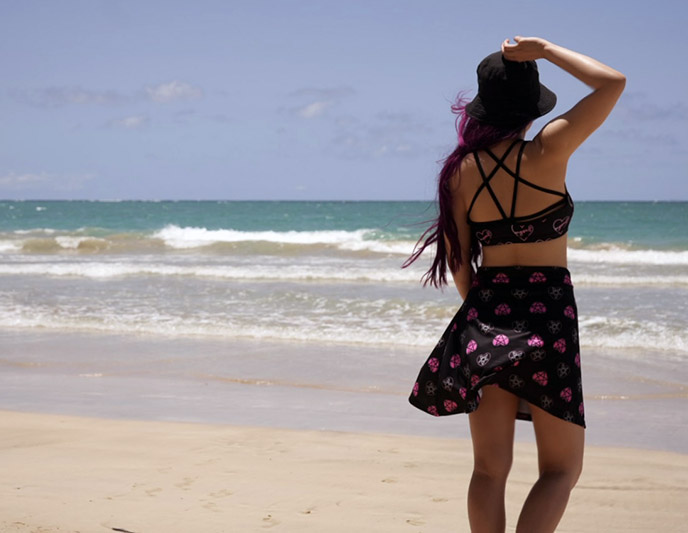
As you can see, there’s so much to enjoy in easygoing Puerto Rico. I got more “Goth on the beach” time at Isla Verde, a beach east of San Juan. I’m wearing an outfit by Too Fast: the pentagram straps and wrinkle/water resistant fabrics were perfect for the ocean.
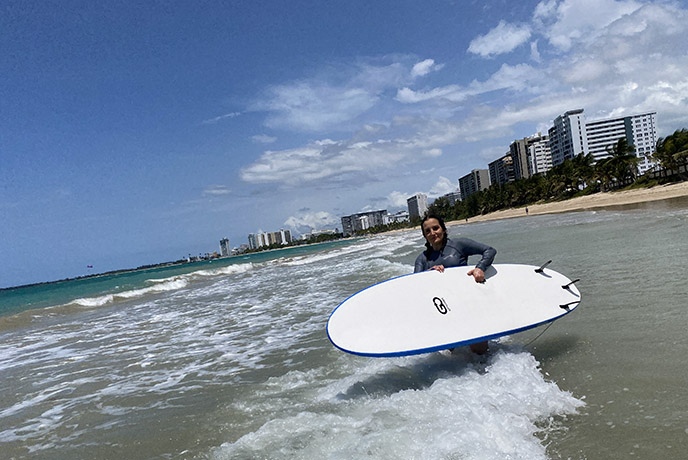
Molly did a surf lesson at Isla Verde, and stood up on the board for the first time! Other water sports and activities are available here, with equipment rentals and lessons at affordable prices.

Meanwhile, I relaxed on the shore. I brought my goat-head in a pentagram bag from Territory store in Osaka. (Owner Taiki-san recently passed, and his Satanic / occult shop is now closed… an enormous loss, and the Japanese dark subculture won’t be the same without him. Yet again, a reminder to make the most of life while we can.)

Hard not to smile at Puerto Rico’s warm ocean waves and uncrowded, clean beaches.

Since Puerto Rico is classified as a US territory, Americans do not require a passport to visit. Flights are also generally inexpensive from the east coast USA. (Just be careful with extra baggage fees and less-than-stellar service if you fly one of the budget airlines.)

This “Goth in hot weather” has been to a few destinations in the Caribbean. Puerto Rico stands out for its natural beauty, and San Juan is well-developed (lots of places to eat and stay) without feeling too touristic.
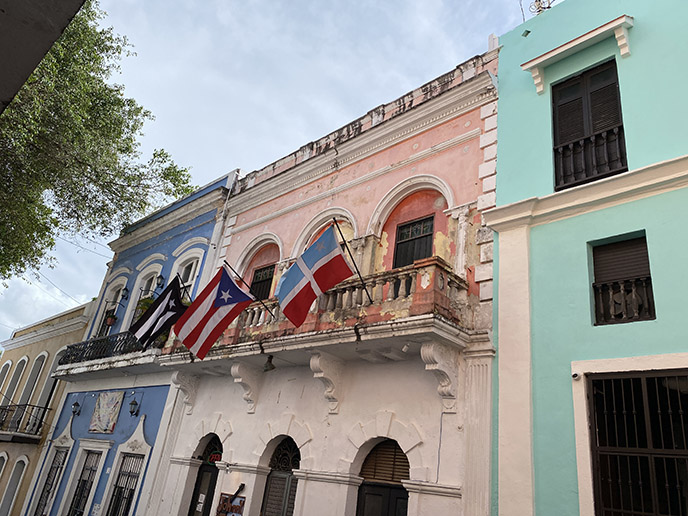
Old San Juan, the historic colonial district of the capital, is a must-see. We had a lovely day walking up and down the hilly cobbled streets, and admiring the colorful facades that shows a mix of architectural styles.
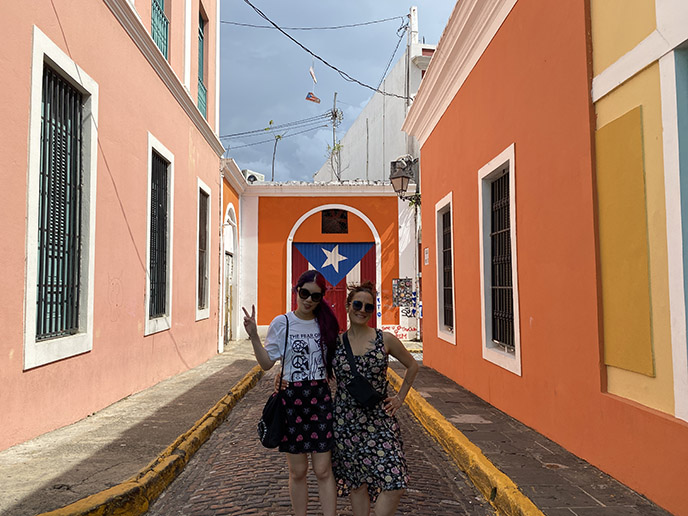
You’ll find lots of Instagrammable photo spots in Old San Juan. We posed in front of a door painted with a Puerto Rican flag, located at Calle de la Virtud, Viejo San Juan.
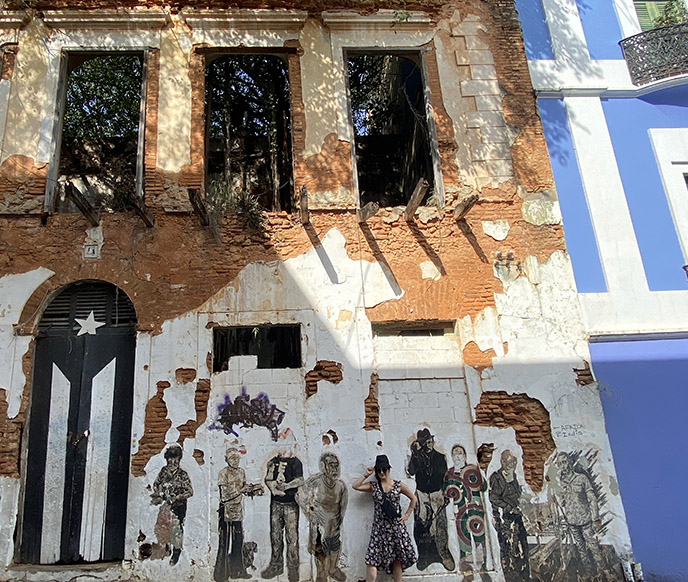
We also came across a black-and-white version of the flag, which symbolizes the people’s ongoing resistance in Puerto Rico (whether it is to colonization, corruption, or other issues).
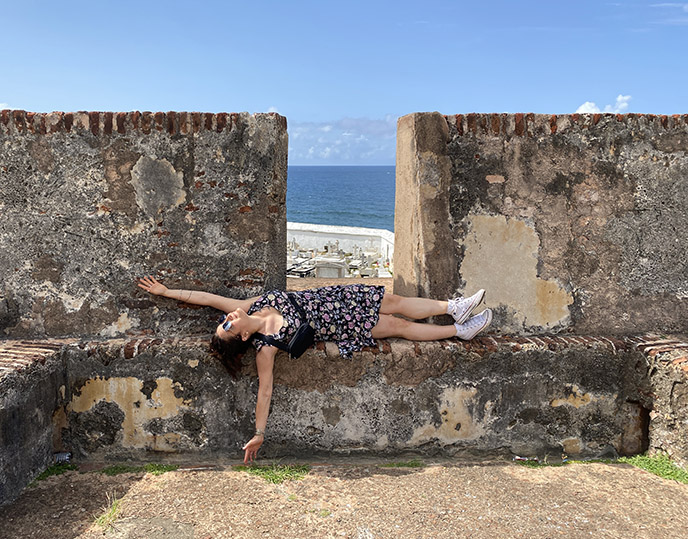
I think you can tell we had fun moseying around Castillo San Felipe del Morro, a 16th century citadel that protected San Juan from pirates.
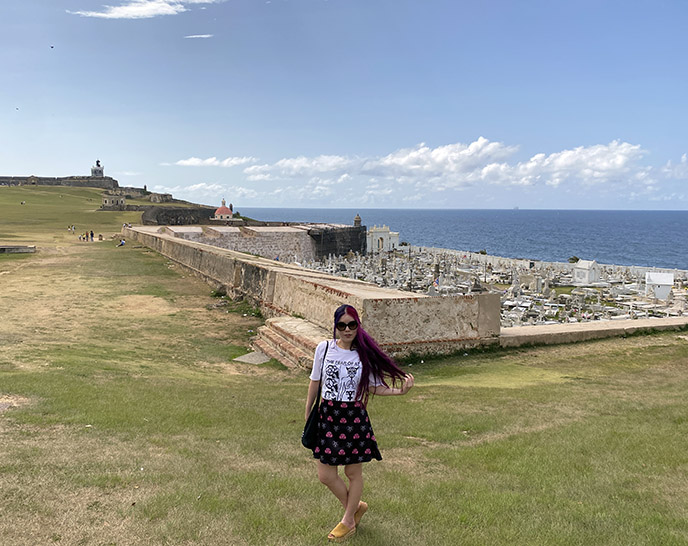
Next to the fortress is Old San Juan Cemetery – Santa Maria Magdalena de Pazzis, which features ornate Goth headstones overlooking the ocean.
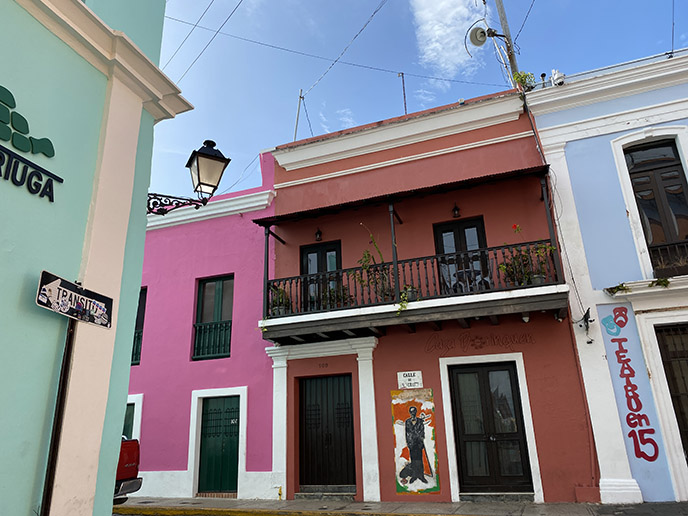
We enjoyed peeking at the local clothing and swimwear boutiques in Old San Juan, and admiring the rainbow buildings and balconies.
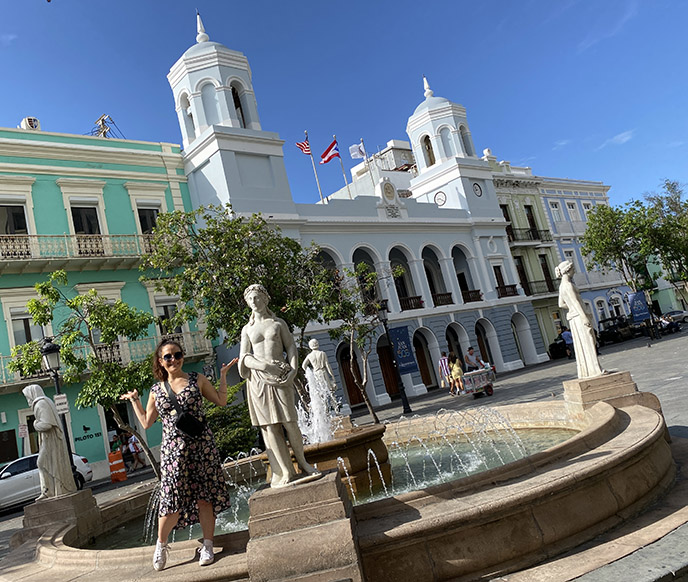
Get an iced coffee at the excellent Cuatro Sombras, and have lunch at a bare-bones Puerto Rican eatery such as Deaverdura, El Jibarito, or Vaca Brava.
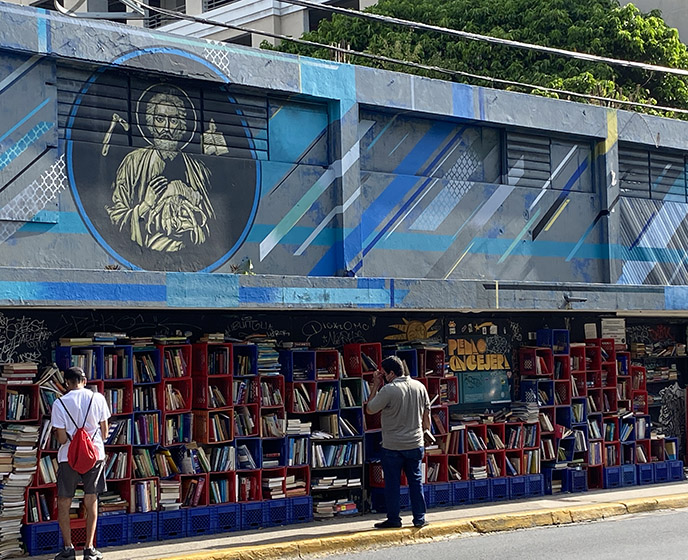
There’s also lots to see around the Condado beach area, including surf shops and the above bookstore. The clubbing / party district, La Placita de Santurce, is not far from here. (We weren’t into the rowdy club scene of La Placita, but loved watching locals dance la bomba, salsa, and more at the open-air Delavida.)

And be sure to taste all of Puerto Rico’s local specialties! We drank pina coladas (the coconut, rum, pineapple cocktail that originated here) and chichaito shots (made with Anisette liqueur and white Palo Viejo rum). In the district of Piñones, we had fresh-caught grouper with mofongo or trifongo (a mash made from plantains and yucca).

I hope this look back at Puerto Rico inspires you to plan a trip to the friendly island, and play in the waves yourself. (Red bikini by UK Swimwear.)
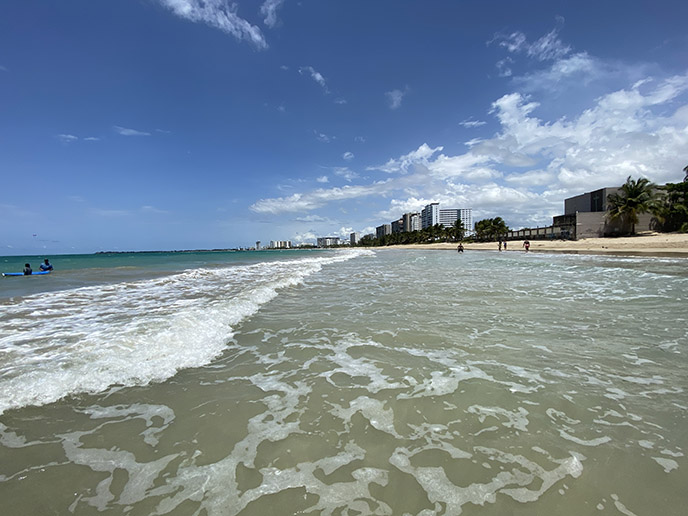
For more Caribbean travel stories, you can see my Dominican Republic adventure with Molly from five years ago (how time flies, and how things can change in unexpected ways). We’re both keen to do another trip soon… Got any destination suggestions?
SHARE & COMMENT
The Bostonian Boston hotel & North 26 Restaurant review! John Waters Baltimore tour, American Visionary Arts museum.

It’s been a while since I’ve dressed up for an event! (Above is what I wore for my cousin’s wedding — haven’t been to a gathering like this in years now.)
I’ve been making the most of reprieves in The Collapse to see family and friends. If you’ve been following my @lacarmina Instagram, you’ll know I was recently hopping around Boston, Baltimore, and Puerto Rico.
(Wearing a For Love & Lemons dress and Alexander McQueen skull bag. Click below for more of their designs:)

Before returning home, I flew to Boston for a quick visit. Read on for soaring photos of my stay at The Bostonian Boston hotel, where I got to channel The Crow on their rooftop pati

I took my Too Fast Moon Phases dress out to play at The Bostonian Boston, a Millennium hotel. Love the striking design featuring bat-wing bell sleeves and a witchy starry moon print.
It felt great to spread my wings inside my spacious Deluxe Room that featured a makeup / vanity area, large plush bed, and balcony.
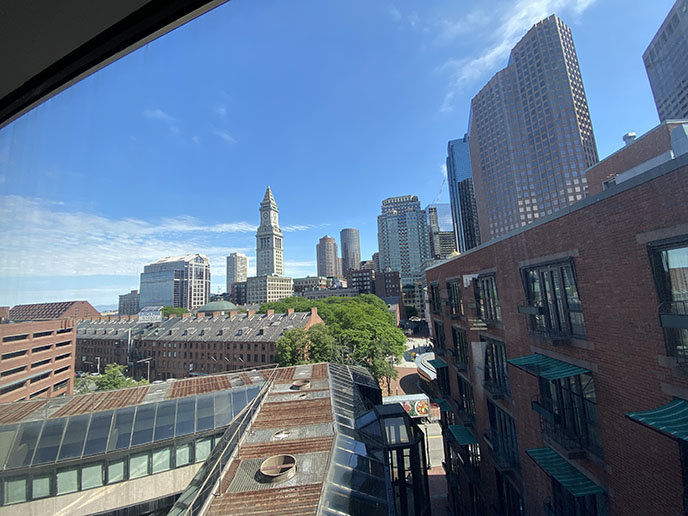
The Bostonian’s contemporary rooms feature these photogenic views of historic downtown Boston, Quincy Market, and Faneuil Hall Marketplace (which is located right across the street from the hotel).
From my private Juliette balcony, I got to enjoy a bit of sun on my legs while looking out at the waterfront and surrounding North End architecture, which ranges from classic brick to Brutalism.
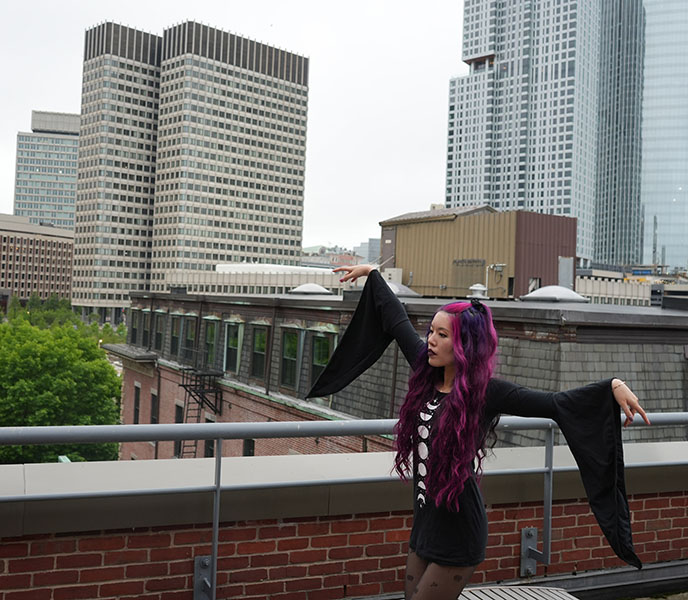
The Bostonian Boston’s 7th floor also has a large rooftop patio with lounge chairs and tables, which any guest can access.

The hotel’s location is as good as it gets, if you want to be close to Boston’s main attractions. I only had to walk a few minutes to find excellent shops and food, such as poke burritos. I also had fun meandering around the nearby docks.

The Bostonian’s cheerful staff and chic red-and-black lobby were among the highlights of my stay. (Wearing a bell-sleeved Gothic dress by Too Fast Clothing.)
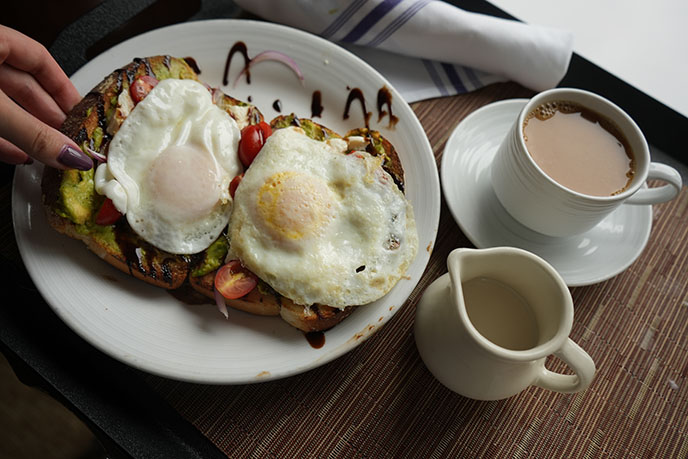
Room service from North 26 is also very reasonably priced. I lazed around with avocado toast (topped with eggs, mozzarella, tomatoes, balsamic) and coffee with almond milk.

The downstairs restaurant, North 26 Restaurant and Bar, stood out for its casual and locally sourced fare, including traditional New England seafood with modern elements.

The bartender showcased his talent for cocktails: picante margarita with jalapeno tequila, orange liqueur, and lime. A starter of crab cakes with spicy remoulade and arugula hit the spot.
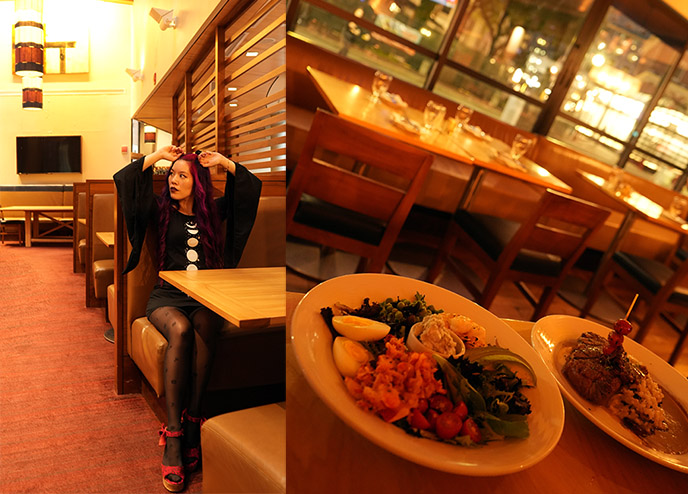
Then came a fresh Maine Lobster & Shrimp Cobb with blue cheese, and succulent New York Sirloin with wild mushroom risotto.

The Bostonian Boston hotel and North 26 restaurant have it all: superb views, location, service, and dining. I’d swoop back here any time for more. Cheers to Millennium Hotels for the stay.

On the same trip, I had the opportunity to experience Baltimore, Maryland for the first time. I attended my cousin’s wedding at Catonsville Overhills Mansion / Whitehouse Caterers.
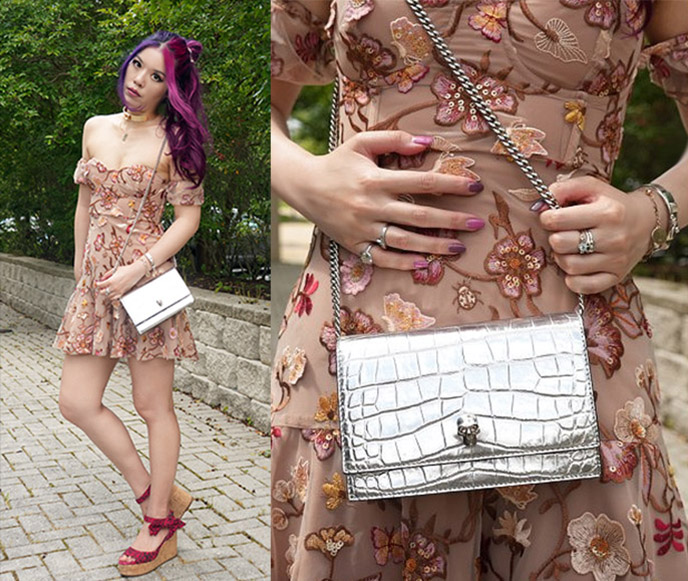
I wore some of my favorite fashion for the occasion: For Love & Lemons Botanic strapless dress and Alexander McQueen silver skull bag. (Find these designs below):
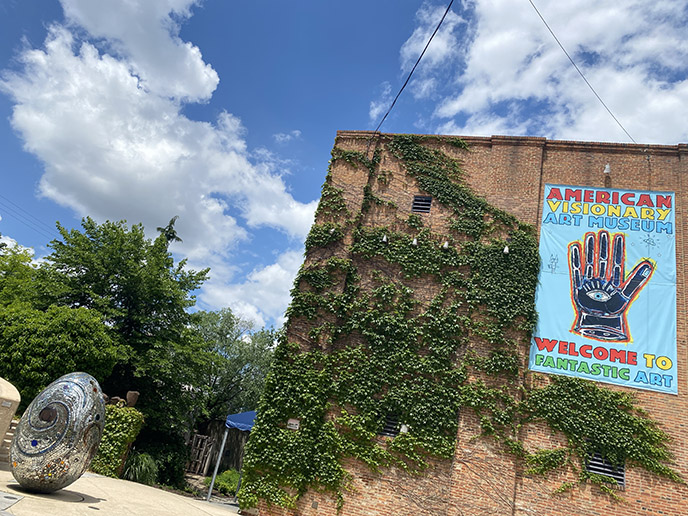
When in Baltimore… do what John Waters would do! This is the hometown of the cult film director known for his eccentric, fabulous comedies — including Pink Flamingos, Female Trouble, Hairspray, and Cry-Baby.
I made a bee-line to the American Visionary Art Museum, as it is right up John Waters’ surrealist alley.
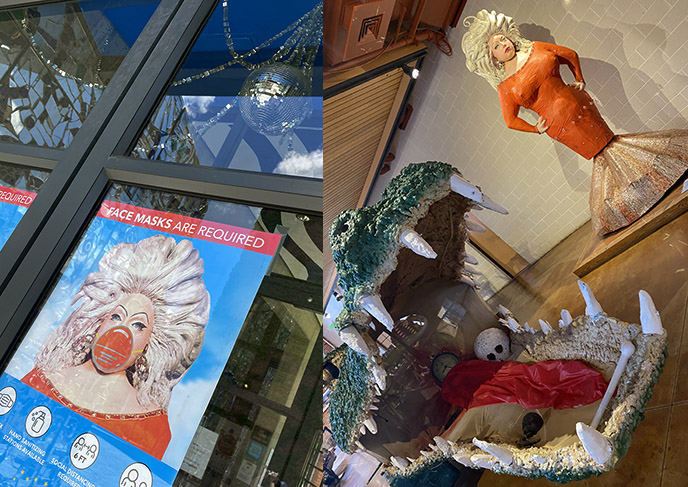
Many of John Waters’ films star drag queen and disco diva Divine. At the entrance, a poster of her highness asks visitors to mask up.
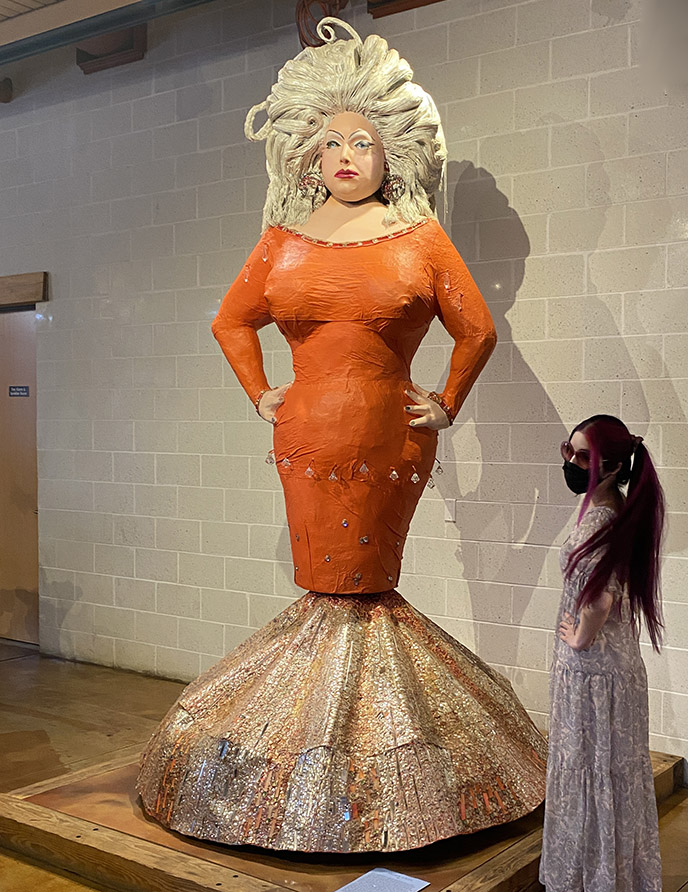
The museum’s Jim Rouse Visionary Center houses a 10-foot statue of Divine by her friend Andrew Logan. The fierce queen spins from side to side, in her iconic orange dress from Waters’ Pink Flamingos movie.
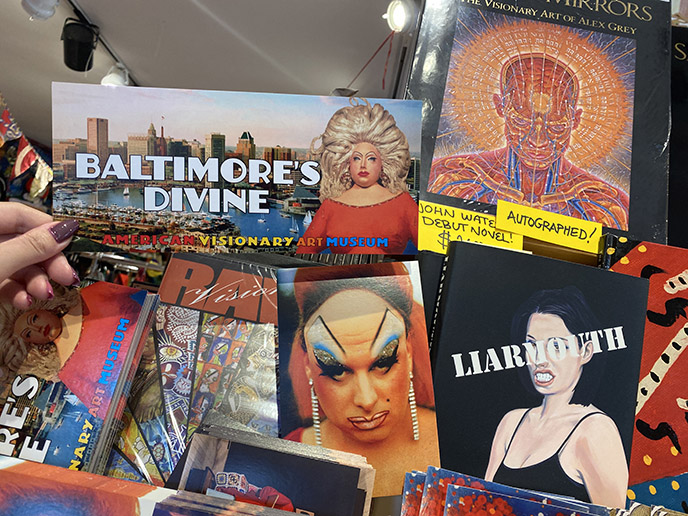
You can also fine Divine memorabilia at The American Visionary Art Museum’s gift store, Sideshow. Above is a Baltimore postcard of the drag queen, and an autographed copy of John Waters’ new novel, Liarmouth.
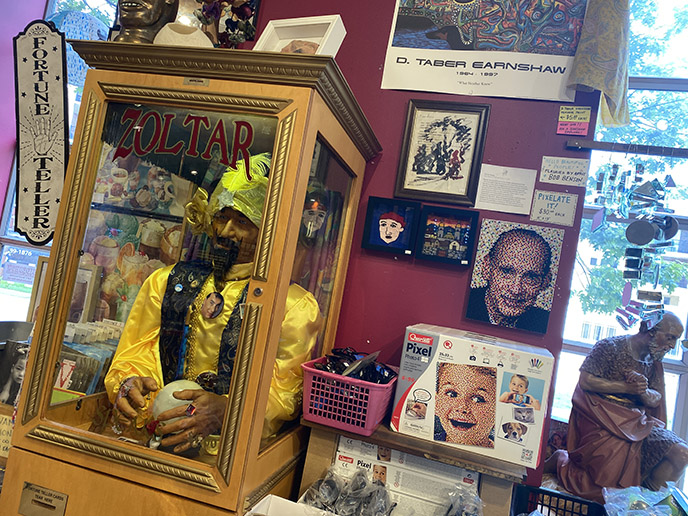
A sign proclaims that John Waters considers Sideshow to be the best museum gift store out there — and I’d have to agree. I was mesmerized by the kooky and imaginative selection of items…
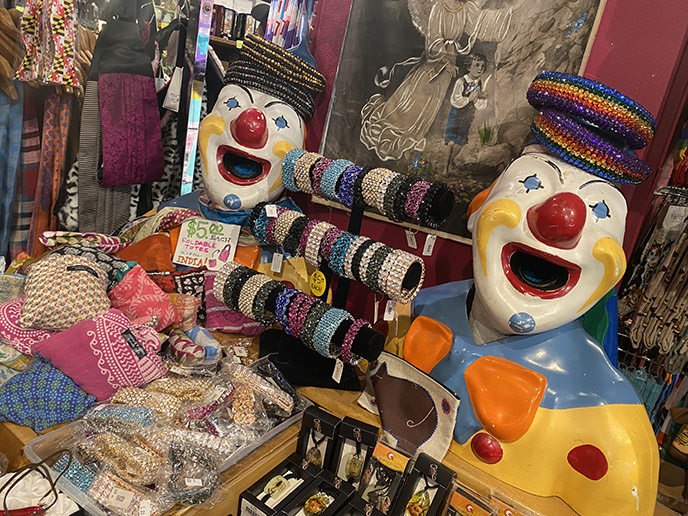
… such as sparkly bracelets, gag gifts, and Nepalese peace sign bags (I got one of those).
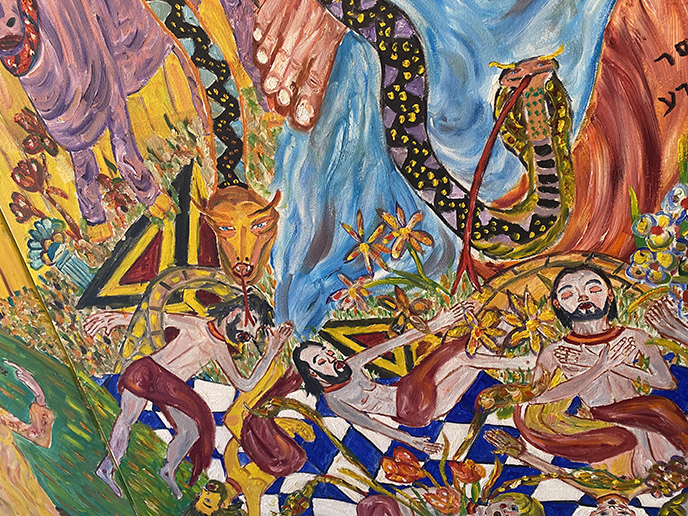
The American Visionary Art Museum consists of two buildings and an outdoor sculpture area with an head-scratching, eye-popping selection of permanent and special exhibits. The AVAM features self-taught and intuitive “outsider artists,” meaning that their works have plenty of passion and imagination, and aren’t afraid to bend so-called design rules.
Case in point: a depiction of the Biblical Job’s story includes details of a serpent Satan, and a golden cow licking out a sinner’s eye!
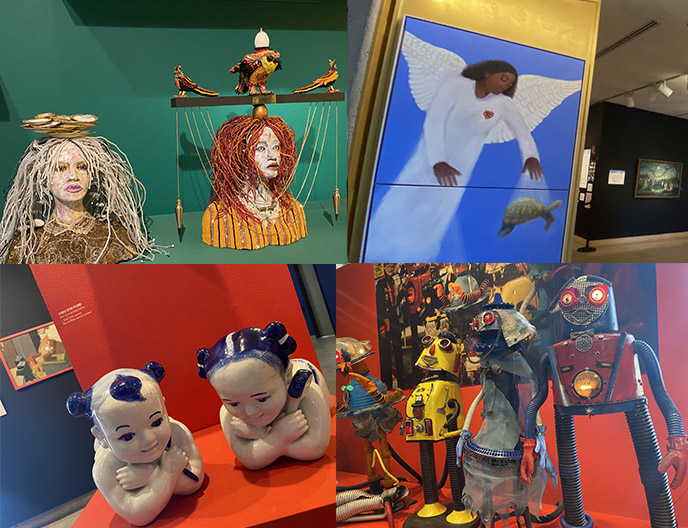
Here are more examples of the offbeat Art Brut at AVAM. The above two works are part of a healing and compassion gallery (I chuckled at the angel saving the turtle!) Below are Chinese opium pillows and a robot family: humorous and charming outsider art that you wouldn’t find in a typical museum.
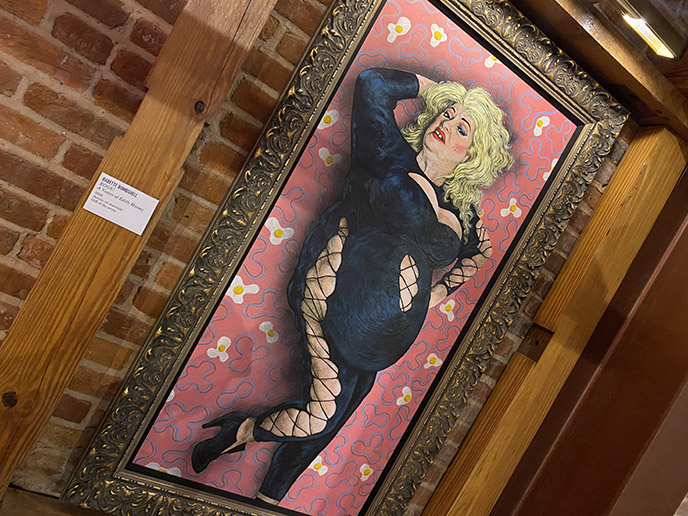
After exploring the three floors of the Main Building, don’t miss out on the Jim Rouse Visionary Center. I was tickled to see this portrait of actress Edith Massey as Edie, the egg-loving trailer-dwelling mother in John Waters’ Pink Flamingos.
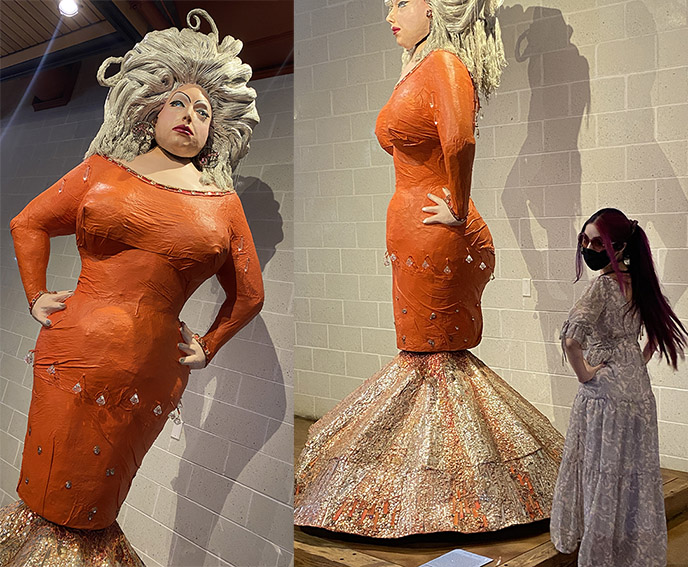
And here’s the big bitch queen herself… Divine! As the late drag star sings in her catchy disco song, “Turn around, stand up like a man and look me in the eye. Turn around, take one final look at what you’ve left behind!”
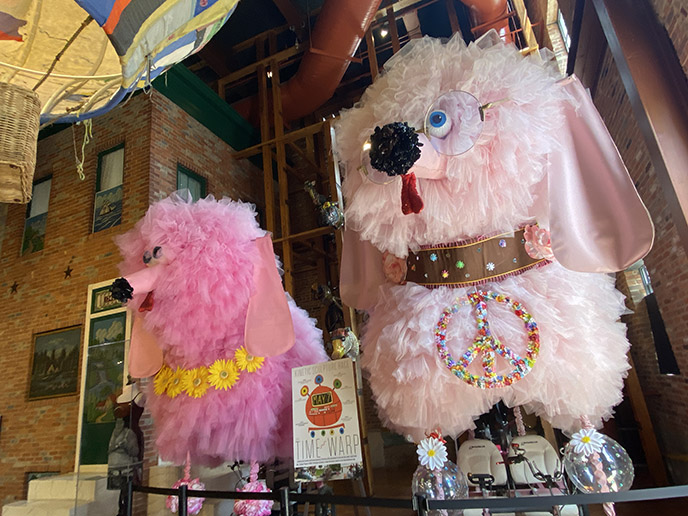
The AVAM runs an annual Kinetic Sculpture Race, among other creative events. Here are 15-foot fluffy pink poodles that participated in the race.
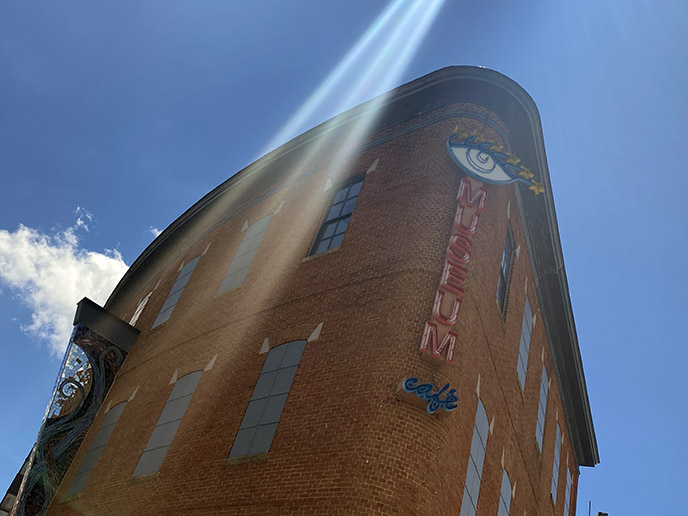
I had an illuminating time at Baltimore’s American Visionary Museum — it was one of my favorite art experiences in recent memory. Don’t forget to visit Sideshow gift store, and say hi to owner Uncle Fun and the colorful staff!
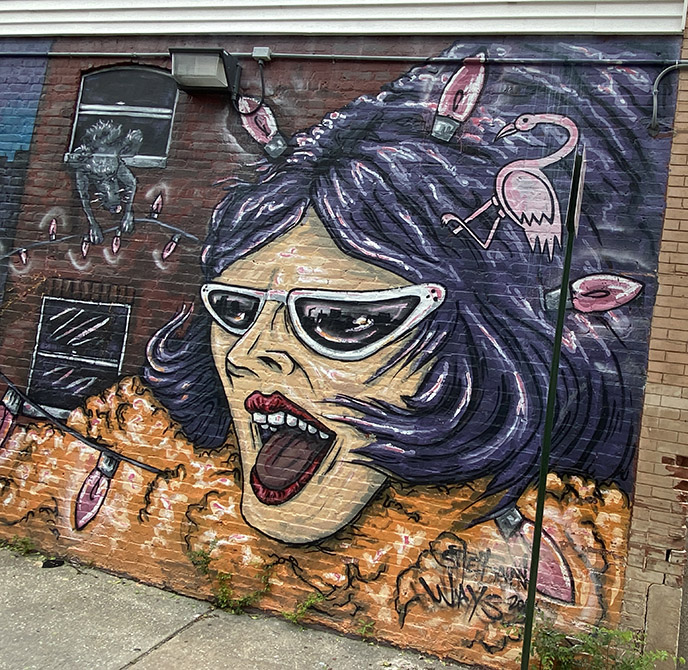
Next, I went to hang out in John Waters’ favorite Baltimore neighborhood — Hampden. As you saunter through the hip area along 36th Street, you’ll feel like a main character in one of his movies. (I spotted a mural of Mink Stole as the degenerate villain Connie Marble, from his 1972 movie Pink Flamingoes.)
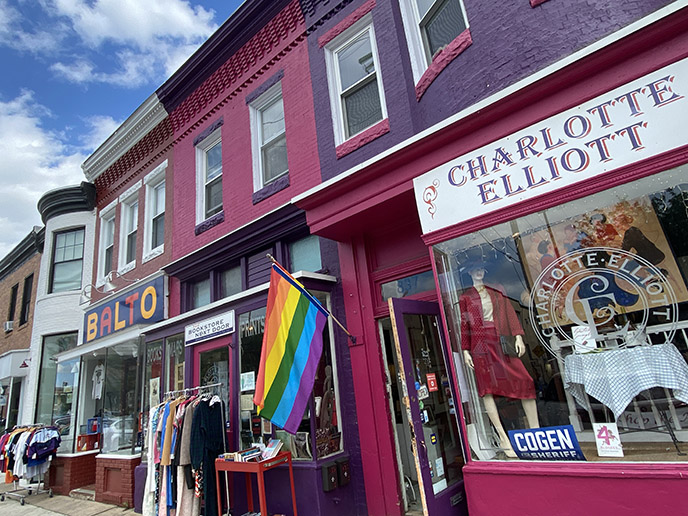
Many scenes from John Waters’ films were filmed in Baltimore’s Hampden, including Pecker and Hairspray. You might recognize the bright row houses from his cinematography (and as you’d expect, this is the city’s LGBTQ+ district).
John Waters has a nearby residence, and often spends time hanging in Hampden. Browse the director’s beloved Atomic Books, along with vintage clothing and record stores. Grab food at Ekiben (the yuzu juice rocks), and peek at The Food Market restaurant (the site of scenes from Pecker).
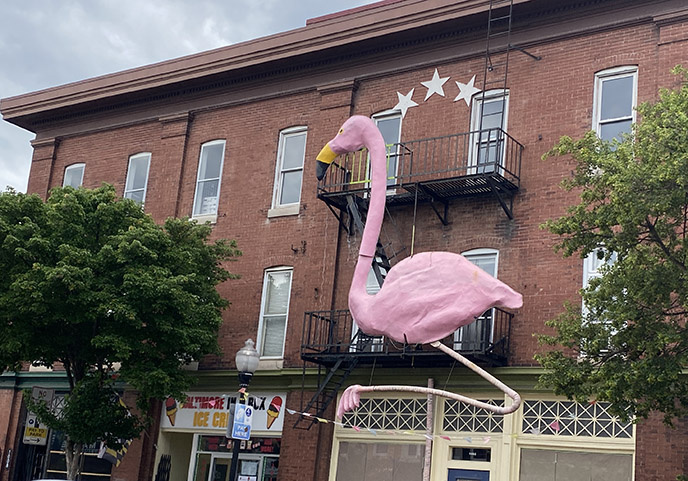
Wave hello to the 30-foot pink flamingo sculpture, which poses over The Avenue and was made by Randall Gornowich.
Although I didn’t have much time in Baltimore, I’m pleased I got to get a glimpse of John Waters and Divine’s filthy, flamboyant universe. Have you ever been, or wanted to go?

 LA CARMINA
LA CARMINA






